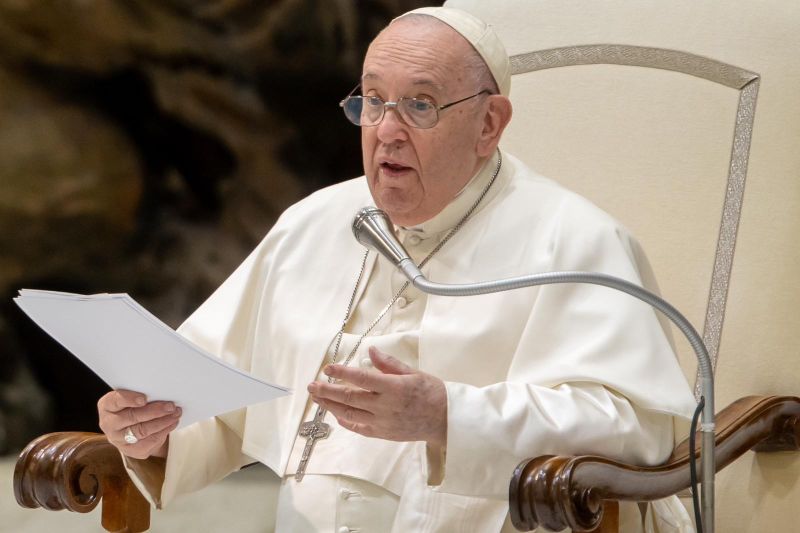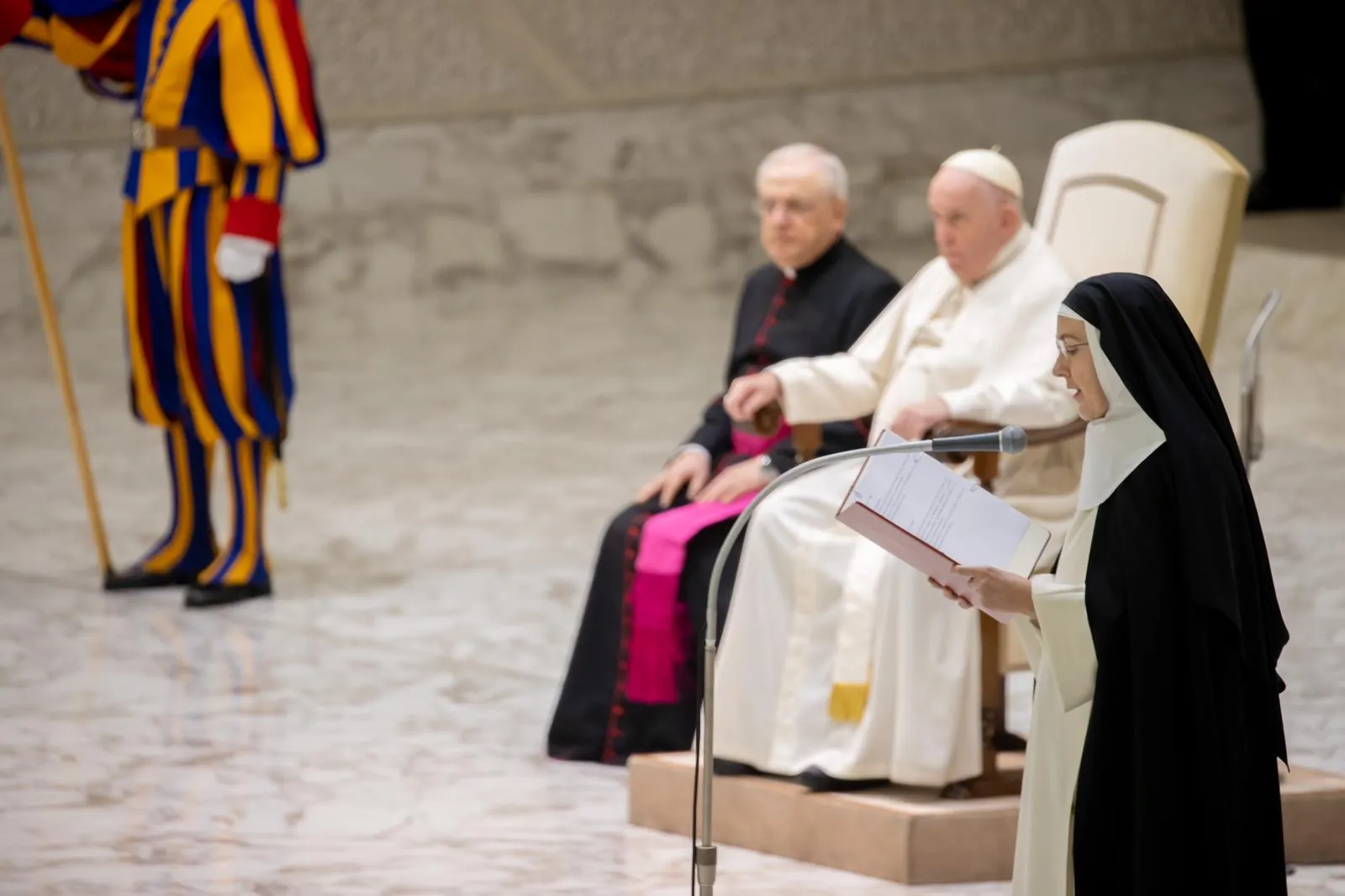
Vatican City, Jan 18, 2023 / 06:05 am (CNA).
Pope Francis invited Christians on Wednesday to pray for the grace to have a “pastoral heart” like Jesus that “suffers and takes risks” out of love for others.
At his weekly public audience on Jan. 18, the pope said that Jesus provides “the unsurpassed model of evangelization.”
“Christ not only has the words of life, but he makes his life a Word, a message: that is, he lives always turned toward the Father and toward us,” Pope Francis said in Paul VI Hall.

“Indeed, if we look at his days as described in the Gospels, we see that intimacy with his Father – prayer – occupies the first place. … Specifically, within this relationship in prayer which connects him to the Father in the Spirit, Jesus discovers the meaning of his being human, of his existence in the world as a mission for us,” he said.
After praying each day, Jesus dedicated his time to proclaiming the Kingdom of God and serving people, especially the poorest, the most vulnerable, the sinners, and the sick, the pope added.
Pope Francis said that one of the best images to represent Jesus’ style of life is that of “the Good Shepherd” who “lays down his life for his sheep” (Jn 10:11).
“By being with Jesus, we discover that his pastoral heart always beats for the person who is confused, lost, far away,” he said.
In this, Jesus the Good Shepherd provides a model against which “to evaluate our pastoral care,” Francis added.

The pope recommended rereading often chapter 15 of the Gospel of Luke, which contains the parable of the lost sheep, to come to truly understand apostolic zeal.
“There we discover that God does not contemplate the sheep pen, nor does he threaten them so they won’t leave. Rather, if one leaves and gets lost, he does not abandon that sheep but goes in search of it. He does not say, ‘You got up and left – it’s your fault – that’s your business!’ His pastoral heart reacts in another way: it suffers and takes risks,” Pope Francis said.
“Yes, God suffers for those who leave, and while he mourns over them, he loves even more. The Lord suffers when we distance ourselves from his heart. He suffers for all who do not know the beauty of his love and the warmth of his embrace. But, in response to this suffering, he does not withdraw, rather he risks. He leaves the ninety-nine sheep who are safe and ventures out for the lost one. … This is God’s zeal.”
The pope’s general audience message was the second in a new weekly series of catechesis, or teachings, on evangelization and apostolic zeal.
At the end of his general audience, Pope Francis asked for people to join him in praying for a Catholic priest who was killed in Nigeria and for persecuted Christians around the world.
“I ask all of you to join me in praying for Father Isaac Achi, of the Diocese of Minna in northern Nigeria, who was killed last Sunday in an attack on his rectory,” he said.
“So many Christians continue to be the target of violence: let us remember them in our prayers!”

Pope Francis also urged people to pray for peace in “martyred Ukraine,” where a Russian missile strike on an apartment building last Saturday killed 45 people, including six children.
“Last Saturday, a new missile attack claimed many civilian victims, including children. I make the heartbreaking grief of the family members my own,” the pope said.
“The images and testimonies of this tragic episode are a strong appeal to all consciences. One cannot remain indifferent!”
If you value the news and views Catholic World Report provides, please consider donating to support our efforts. Your contribution will help us continue to make CWR available to all readers worldwide for free, without a subscription. Thank you for your generosity!
Click here for more information on donating to CWR. Click here to sign up for our newsletter.






Jesus preached Truth, compassion, mercy, forgiveness, love, justice, and peace.
Yes, you are correct. He did not preach calling on deceased saints and venerating the church over Himself. Sacraments are our duty, yet they do not bring us salvation.
In the love that is Jesus Christ. God bless you.
“Baptism, which corresponds to this, now saves you, not as a removal of dirt from the body but as an appeal to God for a clear conscience, through the resurrection of Jesus Christ…” (1 Pet 3:21).
Dear Carl:
The verse is worth reading several times to gain a clearer intent! We know that some verses challenge the believer to gain a fuller comprehension! You will be well acquainted with Matthew Henry. Looking at his analysis of 1 Peter 3:21:
“Noah’s salvation in the ark upon the water prefigured the salvation of all good Christians in the church by baptism; that temporal salvation by the ark was a type, the antitype whereunto is the eternal salvation of believers by baptism, to prevent mistakes about which the apostle,
I. Declares what he means by saving baptism; not the outward ceremony of washing with water, which, in itself, does no more than put away the filth of the flesh, but it is that baptism wherein there is a faithful answer or restipulation {restatement] of a resolved good conscience, engaging to believe in, and be entirely devoted to, God, the Father, Son, and Holy Ghost, renouncing at the same time the flesh, the world, and the devil. The baptismal covenant, made and kept, will certainly save us. Washing is the visible sign; this is the thing signified.
II. The apostle shows that the efficacy of baptism to salvation depends not upon the work done, but upon the resurrection of Christ, which supposes his death, and is the foundation of our faith and hope, to which we are rendered conformable by dying to sin, and rising again to holiness and newness of life. Learn, 1. The sacrament of baptism, rightly received, is a means and a pledge of salvation. Baptism now saveth us. God is pleased to convey his blessings to us in and by his ordinances, Acts 2:38; 22:16. 2. The external participation of baptism will save no man without an answerable good conscience and conversation. There must be the answer of a good conscience towards God.—Obj. Infants cannot make such an answer, and therefore ought not to be baptized.—Answer, the true circumcision was that of the heart and of the spirit (Rom. 2:29), which children were no more capable of then than our infants are capable of making this answer now; yet they were allowed circumcision at eight days old. The infants of the Christian church therefore may be admitted to the ordinance with as much reason as the infants of the Jewish, unless they are barred from it by some express prohibition of Christ.”
God bless you as you challenge us to grow in Christ,
Brian
Yes, and: “Unless you eat the flesh of the Son of man and drink his blood, you have no life in yourselves. Whoever feeds on my flesh and drinks my blood has everlasting life, . . . for my flesh is true food and my blood is true drink. Whoever feeds on my flesh and drinks my blood remains in union with me.” — John 6:53-56.
Then Luke 22:19 – “And he took bread, gave thanks and broke it, and gave it to them, saying, ‘This is my body given for you; do this in remembrance of me.’
Dear Meiron:
Looking at John 6:53-56, we are presented with a challenging statement. There is a divergence of opinion on this important proclamation, let us examine! Looking at Matthew Henry’s Concise Commentary we find:
“Commentary on John 6:52-59
(Read John 6:52-59)
The flesh and blood of the Son of man, denote the Redeemer in the nature of man; Christ and him crucified, and the redemption wrought out by him, with all the precious benefits of redemption; pardon of sin, acceptance with God, the way to the throne of grace, the promises of the covenant, and eternal life. These are called the flesh and blood of Christ, because they are purchased by the breaking his body, and the shedding of his blood. Also, because they are meat and drink to our souls. Eating this flesh and drinking this blood mean believing in Christ. We partake of Christ and his benefits by faith. The soul that rightly knows its state and wants, finds whatever can calm the conscience, and promote true holiness, in the redeemer, God manifest in the flesh. Meditating upon the cross of Christ gives life to our repentance, love, and gratitude. We live by him, as our bodies live by our food. We live by him, as the members by the head, the branches by the root: because he lives we shall live also.”
There are principled believers in Christ that adhere to the doctrine of transubstantiation. It is left to each follower to determine what Christ is saying. “The New Jerome Biblical Commentary” ought to be considered as a reference point.
God bless you as you honour His name,
Brian
Yes, well said, and yet more…
In his “Introduction to Christianity” (1968), when “explaining that Christ is COMPLETELY [italics] God and COMPLETELY [man]”, not half and half, Benedict also comments that silence is part of the Christian revelation. Silence! And He also notes, for example, “the liberating, detached tranquility of him who lives on that excess of divine justice known as Jesus Christ.”
“Known as[!?],” meaning more than an included or attached virtue…Instead, justice “in person”…also “Truth, compassion, mercy, forgiveness, love, …, and peace,” all in person.
Meaning that in the infinite simplicity of God, Christ as the Word in Person IS the words that he preaches, and preaches the Word that he IS. No distinction. The Incarnation/Real Presence–Christ IS the incomprehensibly divine presence of evangelization. When graced, we then might sometimes “model” ourselves as we follow.